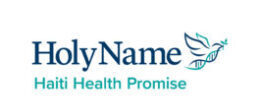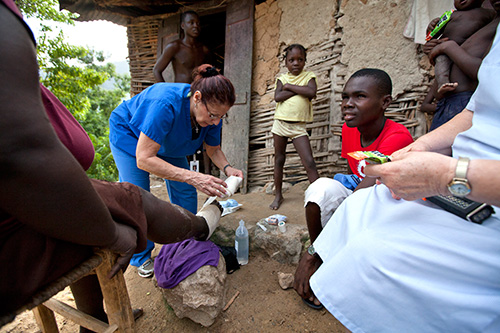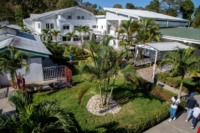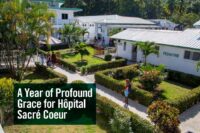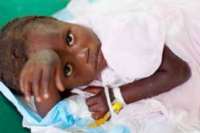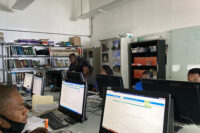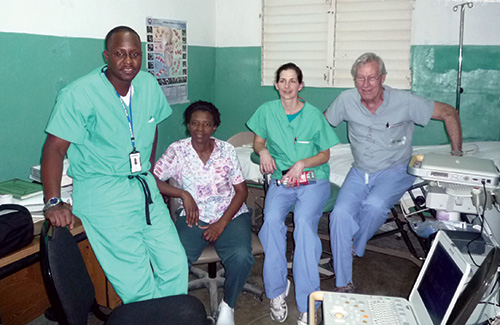
Old Cardio Ultrasound Lab—2011 with (left to right) Dr. Joseph Job, former internist at HSC; Yolene Louis Charles, RN, 2011 trainee and now principal sonographer; Sandra Owens, cardiac ultrasound technologist, volunteer faculty; and Dr. William Battle, Program Manager and medical volunteer from Washington, D.C.
I have had the opportunity to be a part of Hopitâl Sacré Coeur (HSC) since October 2011. I travel to HSC four times a year (January, May, August, and October), and I am intimately involved with the redesign of the cardiology program.
I have to admit, that I always come home with a tremendous sense of exhilaration from the continual progress I witness with each visit at Hopitâl Sacré Coeur in Milot, Haiti.
I have just returned from HSC with a greater sense of pride and excitement over the continual and sustainable progress of the cardiology program, which is now coming to the end of the first year. Collaboration between the HSC physician staff: led by Dr. Prévil, Dr. Julmice, Dr. Louis-Pierre and Dr. Brisma; and the U.S. Cardiology team of Dr. William Battle, Dr. Joe Kannam, Dr. Carl Turissini, Dr. Bob Jarrett, and myself, has provided timely, sustainable and consistent management of the cardiac patients.
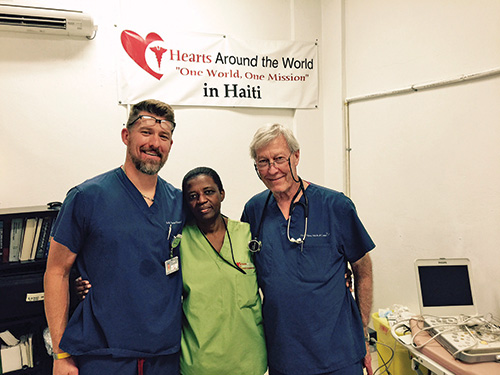
New 2015 Cardio Ultrasound Lab with (left to right) Dan Bourque, cardiac ultrasound technologist, volunteer faculty; Yolene Louis Charles, RN, principal sonographer HSC; and Dr. William Battle, Program Manager and medical volunteer from Washington, D.C.
This exam and review is standard procedure for any patient who will undergo any surgical procedure which would require anesthesia.
During Dr. Finley’s examination of I.L., he found her to have a systolic ejection murmur heard best at the right sternal border at the second intercostal space, and rapid heart rate, known as tachycardia.
In order to safely provide this patient with anesthesia, and safely perform the intended surgical procedure, an important diagnostic test, known as an ECHO cardiogram, needed to be performed to ensure the heart was optimally functioning.
Dr. Finley then reviewed the pre-admission electrocardiogram and found some abnormalities which are indicative of either a myocardial infarction, or a stenosis (malfunctioning) aortic valve of the heart. The question of “How will we be able to obtain the final result of this test by a cardiologist prior to her scheduled procedure?” was the question Dr. Finley needed to have answered. He discussed this situation with Dr. Butler. Dr. Butler told him to get me from the clinic, as I am involved with the cardiology program here at HSC.
So the post anesthesia unit tech/translator Joseph was sent to the clinic to find me. I went directly to the unit and spoke with Dr. Finley. I then reviewed the labs and diagnostic electrocardiogram, and wrote the prescription for and echocardiogram to be performed as soon as possible. Dr. Finley and Dr. Steve Wells, the gynecologist on our team who was going to perform the surgery, were skeptical that any results of the testing would be timely enough and the procedure most likely would have to be postponed.Well if you know anything about Haiti and the trials and tribulations one has to overcome to afford this type of a procedure, then you can only imagine how devastating this postponement would be to this patient, who most likely would not have the money to pay for an additional night or to reschedule this procedure again. I assured them that I will have the results of the echocardiogram within one hour and prior to the start of her scheduled procedure. The look on both of their faces was to say the least, morbid.
I personally took the prescription to the echo-sonographer, Ms. Yolene Louis-Charles, and explained the urgency of the test. I then called Tom Wall, the supervisor for Ultrasonography at Holy Name Medical Center to alert him of the eminent ECHO on I.L., and requested to have Dr. Battle or Dr. Kannam read and dictate an official ECHO result off of StudyCast. StudyCast is the Intranet server for uploading and storing the ECHO’s; and also gives remote access to the team of cardiologists in the U.S. who will have the ability to remotely evaluate diagnostic echocardiograms at any time. This process also enables consultative support to the HSC staff by the cardiology team and offers teaching opportunities to HSC cardiologist Dr. Brisma at any given time.
Within fifteen minutes, Yolene had the patient in the ECHO lab. By thirty minutes, the report was uploaded into StudyCast, with notification by Tom that he received the test and forwarded the request to both Dr. Battle and Dr. Kannam. Within the next twenty minutes, the final official dictated report was sent to my I-phone for review by both Dr. Finley and Dr. Wells.
The great news is that, I.L. was cleared for her procedure by the cardiologist Dr. Battle, and her scheduled surgical procedure was started on-time — 60 minutes from when I was first called by Dr. Butler.
Dr. Finley and Dr. Wells were impressed to say the least with the progress of technology connecting HSC to cardiologists in the U.S. who now have the capability to remotely review and dictate diagnostic tests results as if they were in the room next door. The innovative progress at HSC has most assuredly impacted the lives of the people in Haiti.
As Mr. Rogers used to say… “It’s just another wonderful day in the neighborhood.”
